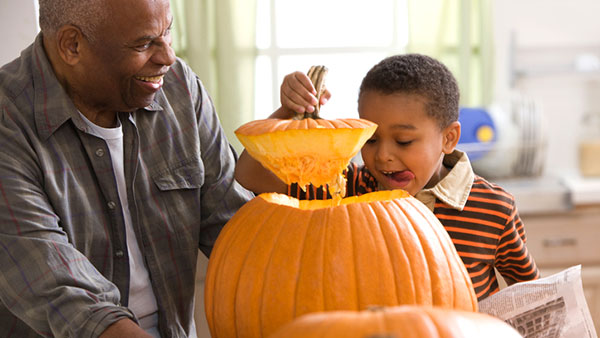
Children can help, but let an adult do the carving.
As late October approaches, children look forward to trick-or-treating, dressing up in costumes, decorating and obtaining more candy than they can possibly eat. As fun as it is, Halloween is also a deceptively dangerous night, and preparations for a safe and enjoyable celebration should begin long before Halloween night.
SELECTING A COSTUME
Select a costume that doesn’t risk slips, trips or falls. Costumes should not drag on the ground.
Wear comfortable shoes for walking. As tempting as it may be to wear shoes themed with the costume – high heels for Cinderella come to mind – they can be unsafe for youngsters to navigate.
Choose a bright costume that motorists can see.
Place reflective tape on costumes and trick-or-treat bags for increased visibility.
Wear costumes with flame resistant fabrics (such as nylon and polyester) or look in the label for the notation, Flame Resistant. Flame resistant fabrics resist burning and should extinguish quickly.
Avoid outfits with big, billowy sleeves and flimsy materials that could contact candles.
Test any makeup on the skin beforehand, and don’t use it if there is an allergic reaction.
Beware of accessories that could injure a child. Choose soft swords, for example, and avoid items with sharp edges.
Be careful when selecting masks, scarves and decorations that nothing obstructs a child’s vision.
PUMPKIN CARVING
No matter how much they plead, don’t let small children handle knives and carve pumpkins. Instead, have them draw their design with markers and let an adult do the carving.
To avoid the possibility of a fire, use a flashlight or glow stick instead of a candle to light your pumpkin. If you cannot avoid using a candle, a small votive candle with a holder is safest.
HOME SAFETY AND DECORATIONS
Outside your home, use flameless candles or keep burning candles and jack-o’-lanterns away from landings and doorsteps, where trick-or-treaters’ costumes could brush against the flame.
Keep your home safe for visiting trick-or-treaters by removing from the porch and front yard anything a child could trip over such as leaves, garden hoses, toys, bikes and lawn decorations.
When indoors, keep candles and jack-o’-lanterns away from curtains, other decorations and other items that could ignite. Do not leave burning candles unattended.
Whether indoors or outside, use only decorative light strands that have been tested for safety by a recognized testing laboratory. Check each set of lights, new or old, for broken or cracked sockets, frayed or bare wires or loose connections. When in doubt – discard.
Don’t overload extension cords.
Restrain pets so they do not inadvertently jump on, scratch or bite a trick-or-treater. It may be best to shut your pet away from the commotion; some animals find Halloween especially spooky.
TRICK-OR-TREATING
An adult should always accompany young children on their neighborhood rounds.
Obtain flashlights with fresh batteries for all children and their escorts.
Make sure cell phone batteries are fully charged. If older children are trick-or-treating by themselves or in groups, review with them the geographic boundaries where they may go.
Remain on well-lit streets and always use the sidewalk. Walk facing traffic. Avoid darting from house to house in the middle of the street – cars aren’t expecting you to be in the middle of the street.
Notify law enforcement authorities immediately of any suspicious or unlawful activity.
Happy trick-or-treating, and be safe!
This loss control information is advisory only. The author assumes no responsibility for management or control of loss control activities. Not all exposures are identified in this article. Contact your local, independent insurance agent for coverage advice and loss control services.
